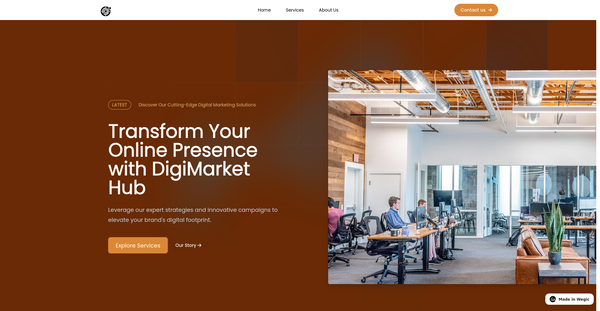Create Personal Website in 3 Steps
A Beginner’s Guide to Create Personal Website
Create Personal Website
In today’s digital age, having a strong online presence is crucial for businesses of all sizes. One of the simplest and most effective ways to establish an online presence is by building a one pager website. A one pager website is a single webpage that provides all the necessary information about your business, products, or services in a concise and visually appealing manner. In this article, we will discuss the benefits of having a one pager website and provide a step-by-step guide on how to build one.

Quick Create Personal Website Guide
Create Personal Website
1. Wix
Wix is a popular website builder that offers a wide range of templates designed for churches and religious organizations. With its drag-and-drop interface, users can easily customize their website to reflect their unique style and branding. Wix also offers a variety of features such as event calendar integration, online donation tools, and media galleries for sermons and other resources. Additionally, Wix provides reliable hosting services and SEO tools to help churches reach a wider audience online.
2. Squarespace
Squarespace is another user-friendly website builder that is well-suited for churches looking to create a modern and visually appealing website. With its stylish templates and customizable design options, Squarespace allows users to create a professional-looking site without any coding knowledge. Squarespace also offers features like event scheduling, donation forms, and social media integration, making it easy for churches to engage with their community online. Additionally, Squarespace provides responsive design capabilities, ensuring that your website looks great on any device.
3. Sharefaith
Sharefaith is a website builder specifically designed for churches, offering a comprehensive suite of tools and templates to help churches create a strong online presence. Sharefaith’s templates are tailored for churches and religious organizations, featuring customizable layouts and designs to suit any style. In addition to website building tools, Sharefaith also provides features such as sermon hosting, online giving options, and church management tools. Sharefaith also offers a library of resources including graphics, videos, and worship media to help churches enhance their online presence.
4. WordPress
WordPress is a versatile platform that can be used to create a wide range of websites, including church websites. With its extensive library of themes and plugins, users can easily customize their website to meet their specific needs and preferences. WordPress offers features such as event calendars, donation forms, and sermon hosting capabilities, making it a great choice for churches looking to engage with their congregation online. Additionally, WordPress is known for its robust SEO capabilities, helping churches improve their visibility in search engine results.
5. Weebly
Weebly is a user-friendly website builder that offers a range of features suitable for churches and religious organizations. With its drag-and-drop interface and customizable templates, users can easily create a professional-looking website without any coding knowledge. Weebly also provides features like event calendars, donation forms, and video hosting capabilities, making it easy for churches to share resources and connect with their community online. Weebly also offers reliable hosting services and responsive design options, ensuring that your website looks great on any device.
Importance of Web Hosting
Web hosting is essential for any website to be visible on the internet. Without web hosting, your website would not be accessible to users. When you sign up for a web hosting service, you are essentially renting server space where your website files are stored. The web hosting provider ensures that your website is available to users 24/7, and also provides technical support and maintenance services to keep your website running smoothly.
Another important aspect of web hosting is website speed and performance. The speed at which your website loads can have a significant impact on user experience and search engine rankings. A reliable web hosting provider will ensure that your website loads quickly and is accessible to users across the globe. In addition, web hosting providers offer security features such as SSL certificates and regular backups to protect your website from cyber threats and data loss.
Different Types of Web Hosting
There are several types of web hosting services available, each with its own set of features and benefits. The most common types of web hosting are:
1. Shared Hosting: Shared hosting is the most basic and affordable type of web hosting. In this setup, multiple websites share the same server resources, including storage space, bandwidth, and CPU power. Shared hosting is ideal for small businesses and individuals with low traffic websites.
2. VPS Hosting: VPS (Virtual Private Server) hosting is a step up from shared hosting. In VPS hosting, websites are hosted on virtual servers that mimic dedicated servers but share server resources with other websites. VPS hosting offers more control and customization options compared to shared hosting.
3. Dedicated Hosting: Dedicated hosting provides users with their own physical server. This type of hosting is ideal for websites with high traffic and resource-intensive applications. Dedicated hosting offers the highest level of performance and security but is also the most expensive option.
4. Cloud Hosting: Cloud hosting is a flexible and scalable hosting solution that utilizes cloud infrastructure to host websites. In cloud hosting, websites are hosted on a network of virtual servers that can be easily scaled up or down based on demand. Cloud hosting is a cost-effective option for websites with fluctuating traffic levels.
Factors to Consider When Choosing a Web Hosting Provider
When choosing a web hosting provider for your website, there are several factors to consider to ensure that you are getting the best service for your needs. Some of the key factors to consider include:
1. Reliability and Uptime: It is crucial to choose a web hosting provider with a proven track record of reliability and uptime. Look for providers that guarantee uptime of at least 99.9% and have robust infrastructure to prevent downtime.
2. Performance and Speed: Website speed and performance are critical for user experience and search engine rankings. Choose a web hosting provider that offers fast servers and optimized performance for your website.
3. Security Features: Security is a top priority for websites, especially those that handle sensitive information. Look for web hosting providers that offer SSL certificates, regular backups, and other security features to protect your website from cyber threats.
4. Customer Support: If you encounter technical issues or need assistance with your website, reliable customer support is essential. Choose a web hosting provider that offers 24/7 support via multiple channels such as phone, email, and live chat.
5. Pricing and Plans: Compare pricing and features across different web hosting providers to find a plan that fits your budget and needs. Consider factors such as storage space, bandwidth, and scalability when choosing a hosting plan.

Getting Started with Create Personal Website
Create Personal Website
In conclusion, the cost of web design can vary widely depending on a number of factors including complexity, customization, platform, and ongoing maintenance. By understanding the factors that influence cost and working with a reputable web design agency, you can ensure that you get the best value for your money and create a website that meets your business objectives. Remember that your website is an investment in your business’s future, so it’s worth investing in quality design and functionality to help your business stand out online.


